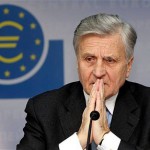Trichet points to opportunity for global monetary reset.
 The day before Christmas is a good day for bad news. In 2013 the IMF decided to publish a Rogoff/Reinhart study on sovereign debt (restructurings) on Christmas Eve, possibly in an effort to avoid too much press attention.
The day before Christmas is a good day for bad news. In 2013 the IMF decided to publish a Rogoff/Reinhart study on sovereign debt (restructurings) on Christmas Eve, possibly in an effort to avoid too much press attention.
This year former European Central Bank President Jean-Claude Trichet choose the 24th of December to give his first interview in which he openly spoke about a possible global currency reset. In traditional central banker speak he calls it a ‘window of opportunity’ for a ‘G7 Currency Accord-deal’ towards a ‘stabilization relation between large convertible currencies.’ In our language; an opportunity for a global monetary reset.
And surprise, surprise.. as mentioned by Bloomberg his ‘suggestion is specifically for currencies that make up the Special Drawing Rights (SDR) basket at the International Monetary Fund. SDRs are currently comprised of dollars, euros, yen and the pound. They do not include the Chinese yuan.’ But as told in The Big Reset that may well change soon.
Since using SDR’s as part of a monetary reset is one of the main themes of my book the Bloomberg’s article is of great interest. So let’s quote it a more in detail;
The former ECB president said the basis for an accord is enhanced by the “conceptual convergence” of the central banks responsible for those currencies. They have now all adopted inflation targets of about 2 percent and have increasingly similar practices on limiting financial risks, surveying banks and even in the way the communicate through press conferences. Trichet spoke out at the end of a year in which declines in the yen and euro sparked suggestions a new currency war is brewing as policy makers appear to be harnessing weaker exchange rates as a way of reviving inflation. At the same time, a soaring dollar is squeezing some emerging-market economies which borrowed in greenbacks or want to avoid an inflationary surge. “This configuration I haven’t seen since the demise of the old Bretton Woods system at the beginning of the 1970s,” Trichet said. “Everyone is paying much more attention to the external value of their currency than before. The Japanese, the British, the Americans and the Europeans as well.” Much will depend on how the U.S. views its currency’s rise. Treasury Secretary Jacob J. Lew said in Johannesburg on Oct. 29 that the strong dollar was a symptom of the strengthening economy, rather than posing a risk. Federal Reserve officials have differed over the challenges posed by an ascending dollar.
Our translation: We need a new Bretton Woods Conference to decide about the next phase for world’s monetary system. But we’re still waiting for US approval.
Bloomberg points to the fact Trichet has ‘attended Group of Seven meetings over the course of three decades’ and next year marks ‘the 30th anniversary of the Plaza Accord, an agreement among the world’s richest economies to push down the value of the dollar’ and explains Trichet’s comment follow ‘a suggestion by economists led by Stephen King at HSBC who said ‘there’s a case for a global accord’ to safeguard the U.S. expansion and reduce savings elsewhere.
The Bloomberg article is another confirmation Jean-Claude Trichet can be seen as the leading figure in preparations for a future monetary system. In the summer of 2014 Trichet delivered a speech during the yearly prestigious Chinese IFF Forum in which he explained the need for a financial reset;
‘The global economy and global finance have reached the turning point, after the world has gone through the global financial crisis’. A new global financial order is essential in the rapidly changing global economy,and strategic dialogues and cooperation are needed to reform the current system.’
He even explained, ‘new rules’ about ‘a new global financial order’ had been discussed with China. 2015 will become a very very interesting year indeed. Can’t wait for the news on Christmas Eve. Merry christmas to you all …

